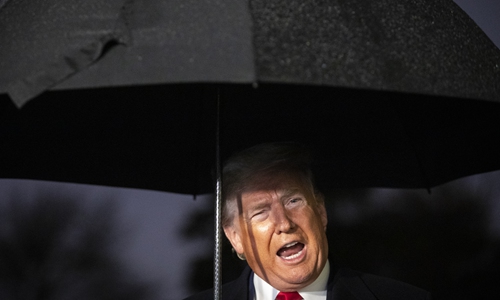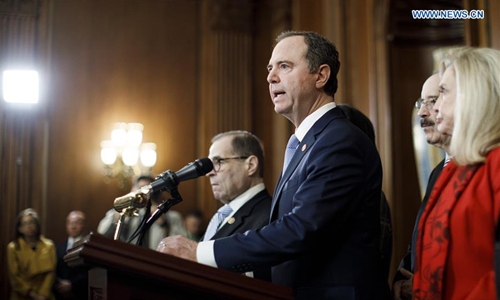Impeachment could make Trump more unpredictable

US President Donald Trump holds an umbrella as he speaks to journalists before boarding Marine One on the South Lawn of the White House on Tuesday in Washington, DC. Earlier in the day, House Democrats announced they will seek two articles of impeachment against him. Photo: AFP
US President Donald Trump is now facing a serious crisis of impeachment launched by the Democrats in the US House of Representatives, prompting Chinese experts Wednesday to note that this could make the White House more unpredictable in foreign affairs, especially in the trade war with China.Trump might adopt a more hawkish approach to prove himself to his supporters, they suggested, but any escalation of the trade war runs the risk of upsetting the US stock market.
The approval rating of the Trump administration is closely tied to US stock markets, they noted, and so if Trump wants to win the 2020 presidential election, a more pragmatic approach that stabilizes the China-US relationship could benefit the economies of both sides.
House Democrats announced two articles of impeachment against Trump on Tuesday, declaring he "betrayed the nation" with his actions toward Ukraine as they pushed toward historic proceedings that are certain to help define his presidency and shape the 2020 election, the Associated Press reported on Wednesday.
The specific charges aimed at removing the 45th president of the US: abuse of power and obstruction of Congress.
Voting is expected in a matter of days by the Judiciary Committee, which begins deliberations Wednesday, and by Christmas in the full House.
The charges, if approved, would then be sent to the Senate, where the Republican majority would be unlikely to convict Trump, but not without a potentially bitter trial just as voters in Iowa and other early presidential primary states begin making their choices, said the AP report.
More unpredictable
Chinese experts told the Global Times they believed the impeachment unlikely to pass the Senate as Republicans won't cooperate, adding that the two charges were far too weak compared to the charges against presidents Bill Clinton and Richard Nixon who also faced impeachment.
"But Democrats can put a shameful label on Trump - the first impeached US president fighting for re-election" as long as the charges were approved in the House," Diao Daming, an associate professor at the Renmin University of China in Beijing, told the Global Times on Wednesday.
This will seriously affect Trump's approval rating among swing voters and the presidential election debate next year would focus more on the past than the future, Diao noted.
"In other words, the impeachment will make the 2020 election focus more on 'Did we make a mistake picking Trump in 2016?' rather than what the US should do in the future. This is a regrettable situation for the US people and its democracy."
What Beijing is wondering is what impact the impeachment will have on China-US relations, especially the trade war and negotiations for a deal.
Chinese analysts found it hard to say but one thing they agreed was certain: Trump would be more unpredictable and that was not a positive development for trade negotiations.
Lü Xiang, a research fellow on US studies at the Chinese Academy of Social Sciences in Beijing, told the Global Times Wednesday that to secure his approval rating and re-election, Trump will spend more time and energy dealing with impeachment and less on foreign affairs.

U.S. House Intelligence Committee Chairman Adam Schiff (C, Front) speaks at a news conference to announce articles of impeachment against U.S. President Donald Trump on Capitol Hill in Washington D.C., the United States, on Dec. 10, 2019. U.S. House Democrats on Tuesday moved forward by announcing two articles of impeachment, accusing U.S. President Donald Trump of abuse of power and obstruction of Congress, culminating over two months of investigation by Democrat-led House committees into the president's dealings with Ukraine. (Photo by Ting Shen/Xinhua)
Pragmatic president?The upcoming deadline of Sunday, December 15, for imposing tariffs on nearly $160 billion in Chinese consumer goods is approaching and Chinese observers predicted another postponement more likely than a final deal.
Two weeks before Christmas, Trump has days to decide whether to impose tariffs.
Regardless of whether or not he signs a deal, once Trump encounters domestic challenges that question his ability to deal with China, he might well tear up the deal again and use a tougher approach to reinforce his base of mostly hawkish right-wingers, Diao said.
"It is hard to predict whether he is going to be tougher or more pragmatic. But one thing is certain: He needs to make sure the economy, especially the stock markets, at least shows an acceptable performance," Lü said.
Any provocation or hawkish decision on trade with China will impact the stock market and as long as China retaliates, the stock market would get hit again, Lü said, "and now the US economy is heavily reliant on the stock market and it is the key for Trump to get re-elected. So if Trump wants to win the reelection, he'd better not take too provocative and hawkish actions."
Lü noted that Trump knows very well he can't afford to lose the election and allow the Democrats to regain control of the country, "he won't just lose political power, he could lose much more than that."
The impeachment and election are internal US affairs and China will not interfere, said Lü, adding, "but we should remind US politicians that no matter what changes happen in US politics, we need to make a decision to serve the interests of the two peoples rather than being short-sighted and make unwise decisions."